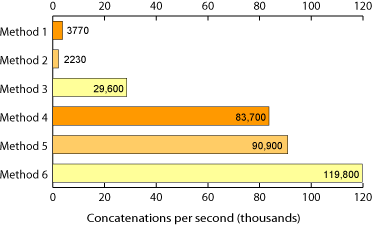Python的string连接vs str.join有多慢?
作为我在这个线程的回答中的评论的结果,我想知道+=运算符和''.join()之间的速度差异。
那么两者之间的速度比较是什么?
来自: 高效的string连接
方法1:
def method1(): out_str = '' for num in xrange(loop_count): out_str += 'num' return out_str
方法4:
def method4(): str_list = [] for num in xrange(loop_count): str_list.append('num') return ''.join(str_list)
现在我意识到它们并不具有严格的代表性,第四种方法在迭代和join每个项目之前附加到列表中,但这是一个公平的指示。
string连接显着快于连接。
为什么? string是不可改变的,不能被replace。 要改变一个,需要创build一个新的表示(两个连接)。

我原来的代码是错误的,看起来+连接通常更快(特别是在较新的硬件上更新版本的Python)
时代如下:
Iterations: 1,000,000
Windows 7,Core i7上的Python 3.3
String of len: 1 took: 0.5710 0.2880 seconds String of len: 4 took: 0.9480 0.5830 seconds String of len: 6 took: 1.2770 0.8130 seconds String of len: 12 took: 2.0610 1.5930 seconds String of len: 80 took: 10.5140 37.8590 seconds String of len: 222 took: 27.3400 134.7440 seconds String of len: 443 took: 52.9640 170.6440 seconds
Windows 7上的Python 2.7,Core i7
String of len: 1 took: 0.7190 0.4960 seconds String of len: 4 took: 1.0660 0.6920 seconds String of len: 6 took: 1.3300 0.8560 seconds String of len: 12 took: 1.9980 1.5330 seconds String of len: 80 took: 9.0520 25.7190 seconds String of len: 222 took: 23.1620 71.3620 seconds String of len: 443 took: 44.3620 117.1510 seconds
在Linux Mint上,Python 2.7,一些较慢的处理器
String of len: 1 took: 1.8840 1.2990 seconds String of len: 4 took: 2.8394 1.9663 seconds String of len: 6 took: 3.5177 2.4162 seconds String of len: 12 took: 5.5456 4.1695 seconds String of len: 80 took: 27.8813 19.2180 seconds String of len: 222 took: 69.5679 55.7790 seconds String of len: 443 took: 135.6101 153.8212 seconds
这里是代码:
from __future__ import print_function import time def strcat(string): newstr = '' for char in string: newstr += char return newstr def listcat(string): chars = [] for char in string: chars.append(char) return ''.join(chars) def test(fn, times, *args): start = time.time() for x in range(times): fn(*args) return "{:>10.4f}".format(time.time() - start) def testall(): strings = ['a', 'long', 'longer', 'a bit longer', '''adjkrsn widn fskejwoskemwkoskdfisdfasdfjiz oijewf sdkjjka dsf sdk siasjk dfwijs''', '''this is a really long string that's so long it had to be triple quoted and contains lots of superflous characters for kicks and gigles @!#(*_#)(*$(*!#@&)(*E\xc4\x32\xff\x92\x23\xDF\xDFk^%#$!)%#^(*#''', '''I needed another long string but this one won't have any new lines or crazy characters in it, I'm just going to type normal characters that I would usually write blah blah blah blah this is some more text hey cool what's crazy is that it looks that the str += is really close to the O(n^2) worst case performance, but it looks more like the other method increases in a perhaps linear scale? I don't know but I think this is enough text I hope.'''] for string in strings: print("String of len:", len(string), "took:", test(listcat, 1000000, string), test(strcat, 1000000, string), "seconds") testall()
这就是愚蠢的程序devise来testing:)
使用plus
import time if __name__ == '__main__': start = time.clock() for x in range (1, 10000000): dog = "a" + "b" end = time.clock() print "Time to run Plusser = ", end - start, "seconds"
输出:
Time to run Plusser = 1.16350010965 seconds
现在join….
import time if __name__ == '__main__': start = time.clock() for x in range (1, 10000000): dog = "a".join("b") end = time.clock() print "Time to run Joiner = ", end - start, "seconds"
输出:
Time to run Joiner = 21.3877386651 seconds
所以在窗口上的Python 2.6,我会说+约18倍join:)
我重写了最后一个答案,可否请你在我testing的方式上分享你的意见?
import time start1 = time.clock() for x in range (10000000): dog1 = ' and '.join(['spam', 'eggs', 'spam', 'spam', 'eggs', 'spam','spam', 'eggs', 'spam', 'spam', 'eggs', 'spam']) end1 = time.clock() print("Time to run Joiner = ", end1 - start1, "seconds") start2 = time.clock() for x in range (10000000): dog2 = 'spam'+' and '+'eggs'+' and '+'spam'+' and '+'spam'+' and '+'eggs'+' and '+'spam'+' and '+'spam'+' and '+'eggs'+' and '+'spam'+' and '+'spam'+' and '+'eggs'+' and '+'spam' end2 = time.clock() print("Time to run + = ", end2 - start2, "seconds")
注意:这个例子是用Python 3.5编写的,其中range()的行为就像前一个xrange()
我得到的输出:
Time to run Joiner = 27.086106206103153 seconds Time to run + = 69.79100515996426 seconds
就我个人而言,我比较喜欢''Plus([]),因为它更干净,更具可读性。